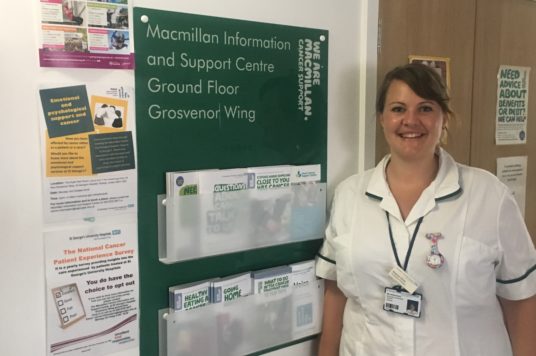Cancer patient pens praise for occupational therapy
We often share patient stories and feedback at St George’s. Here, we have the story of Paul, 51, who was diagnosed with Plasma Cell Leukaemia in March 2013 and has been in and out of hospital receiving treatment ever since.
During his most recent hospital stay, in Gordon Smith Ward at St George’s, he wrote about his cancer experience and the effects of his treatment with Occupational Therapist, Meghan White.
Paul said: “I felt like I’d lost control of my life. I was fed up of my body not feeling like my own body – but occupational therapy has shown me that I haven’t and that I’m not alone in this.”
Meghan (pictured) said: “Occupational therapy helps to reintroduce patients to everyday tasks and increase their confidence in performance through teaching them techniques to increase their independence in preparation for discharge.”
Paul’s article can be read below.
You can teach an old dog new tricks
Written by cancer patient Paul, aged 51 and Meghan White, Occupational Therapist
After being diagnosed with Plasma Cell Leukaemia in March 2013 I was re-admitted to St George’s Hospital three weeks ago, and during this time I have endured many neurological and scientific tests. However, I have found the most progress and satisfaction from occupational therapy (OT). Perhaps I have hit a brick wall when it comes to prescription medication and cancer treatment.
I was sceptical about occupational therapy and I had become dependent on too many medical treatments such as blood tests, cannulas, scans, IVs, and transplants. Perhaps I thought a physical therapy couldn’t change, affect, or alter the human body like modern cancer drugs do.
Naively, I was also once under the impression people were born disabled, became disabled during old age or through an accident. The many modern, unforeseen illnesses of today such as (cancer, dementia, diabetes etc) changed these assumptions.
Plasma Cell Leukaemia, for me, now means lost or muddled commands sent from my brain, via nerves, down my arms to my fingertips. This equates to my loss of strength, coordination, and difficulty doing simple tasks. And this overlooks the fact that merely using my hands is now painful.
Occupational therapy involves repeated physical exercise to remap/relearn the hand commands (nerve paths) previously used to complete a task. OT can be imagined like in the movie The Karate Kid where Mr Miyagi (my OT instructor Meghan White in this case) shows you a series of simple tasks, which when completed amounts to much more than the sum of the parts. Yes, it requires dedication, but then anything worthwhile in life usually does.
With time you realise these carefully crafted mental and physical exercises can partially (and importantly) recover a wider range of hand, arm, and finger control.
Without being conscious of it we make a great deal of use of our hands whether on a computer, phone, tablet, diary scribbling down notes, bathing, washing, baking, cooking, or eating breakfast.
We also make use of our hands for just about everything – whether that is withdrawing money from a bank, paying for magazines in a newsagent, or turning the page of a novel. Our bodies are such incredible machines capable of tasks that require great finesse, dexterity, while at other times simple brute strength is required.
Without regularly using our hands they quickly deteriorate, becoming stiff, painful, and difficult to use. Surprisingly, this doesn’t take long to happen. I went from having great mobility in my hands to very little in a just over a month.
My deterioration was such that it is clear why doctors encourage patients to move about as soon as possible after surgery. It’s a case of use it or lose it.
I have also realised that the body finds and uses muscles that you didn’t realise existed or needed until you become disabled. I have never been so conscious of the way my stomach muscles are needed in so many different ways from helping to sit upright, make a fist, or to make visits to the toilet less painful.
I suppose the secret of occupational therapy (and all education or rehabilitation) is your teacher. In this case Meghan, who shows, and enthuses the pupil (you or I) with the energy, and oomph to practise, because practice makes perfect… in anything, especially health.
After all as the saying goes “without your health, you have nothing” – at least until you come to terms with your particular situation.
Notes to editors
This article was written by Paul, one of our cancer patients. His aim is to share his experiences with those in a similar position to him.
Photo: Meghan White, Occupational Therapist at St George’s



